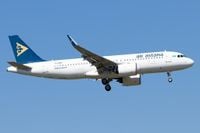The global airline industry is in the midst of a bustling period of change, with new partnerships, route launches, and strategic expansions reshaping the travel landscape as the world heads into late 2025 and early 2026. From codeshare agreements connecting continents to fresh domestic routes making once-remote destinations easily accessible, airlines are hustling to meet surging demand and adapt to shifting travel patterns.
One of the latest developments comes from Dubai-based low-cost carrier flydubai, which on September 11, 2025, inked a new interline agreement with Romanian national carrier TAROM. This deal allows flydubai passengers to connect through Bucharest Henri Coanda International Airport to 15 TAROM destinations, including major European cities like Amsterdam, Athens, Brussels, Frankfurt, Madrid, and Paris. Flydubai, which has been serving Bucharest since 2012 with twice-daily flights, is set to add Iasi as its second Romanian destination on September 19, according to Aviation Week Network. This move strengthens the airline’s foothold in Eastern Europe and offers travelers greater flexibility and connectivity across the continent.
Meanwhile, Emirates is making waves in China. The airline will deploy its brand-new Airbus A350 on daily services to Hangzhou starting October 26, just three months after launching the route. Adnan Kazim, Emirates’ deputy president and chief commercial officer, commented, “Introducing the A350 to Hangzhou is the natural next step, as we continue to bring the latest and greatest that Emirates has to offer to China’s skies.” The A350 marks the first new aircraft type to join the Emirates fleet since 2008, signaling a significant investment in passenger comfort and operational efficiency.
Across the Atlantic, Air Caraïbes and Caribbean Airlines have launched a codeshare partnership that will see Caribbean Airlines place its code on Air Caraïbes flights from Fort-de-France and Pointe-à-Pitre to Paris Orly, as well as regional services to St. Martin and between the French Antilles. In return, Air Caraïbes will codeshare on Caribbean Airlines-operated routes linking Bridgetown with Fort-de-France, Pointe-à-Pitre, and Port of Spain, plus services from Trinidad to St. Lucia Vigie and Martinique. Air Caraïbes is also set to broaden its Dominican Republic network this winter with a new nonstop Paris Orly–Samaná service and the resumption of direct flights from Santo Domingo, according to Aviation Week Network.
Brazil’s GOL Linhas Aéreas is responding to rising business and leisure demand by launching a new daily service connecting Rio de Janeiro Galeao with Macapa via Belem starting December 1. The route, operated with Boeing 737-8 aircraft, aims to bridge Brazil’s southeast and north regions, making travel between these economic hubs more convenient.
In Central Asia, Air Astana and Air India have taken their partnership to the next level. On September 10, the two carriers launched a codeshare agreement covering flights between Almaty and both New Delhi and Mumbai, building on an interline arrangement set up earlier in 2025. This earlier tie-up had already granted Air Astana access to 18 Indian domestic destinations and nine international routes via Air India, while Air India passengers gained connections to Central Asia and China through Almaty. Air Astana CEO Peter Foster said the agreement would “help to accelerate business, tourism and student traffic flows,” while Air India CEO Campbell Wilson called Kazakhstan “a fast-growing market with immense potential for tourism.” Additionally, Air India plans to introduce nonstop flights from New Delhi to Jaisalmer starting October 26 through March 28, 2026, operating double-daily with Airbus A320 aircraft.
European low-cost carriers are also making moves. Volotea has inaugurated a new French domestic route linking Toulouse-Blagnac Airport and Rennes, expanding its network from Toulouse to 20 destinations across six countries. The twice-weekly service adds more than 11,000 seats annually and marks Volotea’s eighth French domestic destination from Toulouse. Meanwhile, easyJet is bringing forward the launch of its new Newcastle base to March 22, 2026, earlier than planned. With three aircraft stationed at the airport, the carrier will expand its network to 19 destinations, supporting 11 new routes in addition to the eight already operated from Newcastle.
In the United States, American Airlines announced on September 9 that it will launch the only nonstop service between Miami and Bimini, Bahamas, starting February 14, 2026. The route will operate three times a week with Embraer 175 aircraft, making Bimini American’s seventh Bahamian destination. Brian Znotins, American’s senior vice president of network planning, said, “American knows that travelers are looking for unique and varied experiences, and that’s why we’ve added destinations like Bimini to our network.”
Wizz Air is expanding in multiple directions. The carrier will launch a new direct service between Stockholm Arlanda and Tirana, Albania, starting March 2, 2026, operating four times weekly with Airbus A321 aircraft. It’s also investing in Moldova, where two additional Airbus A320ceo aircraft will be based in Chisinau from December 2025 and March 2026, enabling the launch of six new routes and increased frequencies on 10 existing ones. In total, Wizz Air will operate 34 routes to 16 countries from Chisinau, its largest-ever Moldovan network.
India’s IndiGo is set to inaugurate domestic flights connecting Kolkata and Purnea, Bihar, three times a week from September 15, marking Purnea’s new airport opening and making it IndiGo’s 94th domestic and 137th overall destination.
Down under, QantasLink has started year-round flights between Newcastle and Perth, the first nonstop connection between Western Australia and New South Wales’ Hunter Valley region. Operating three times per week with Airbus A319 aircraft, the service is expected to bring about 23,400 inbound seats to Western Australia annually, boosting tourism, business, and sporting travel.
Emirates is also expanding its premium economy offering on flights to New York John F. Kennedy and Milan Malpensa as part of its Airbus A380 cabin upgrades. Starting November 10, flights EK205/206 via Milan will feature premium economy, and from December 1, premium economy will also be available on Dubai–New York flights EK201/202.
Qazaq Air will continue operating subsidized flights on “socially important routes” across Kazakhstan from November 1 to December 31, maintaining essential connectivity for communities across the country.
Qatar Airways and China Southern Airlines are deepening their partnership from October 16, expanding codeshare coverage to include Beijing Daxing-Doha flights and additional connectivity to 15 destinations across Africa, Europe, and the Middle East.
In South America, Flybondi will launch flights from Puerto Iguazu, Argentina, to Lima, Peru, starting December 1, operating four times a week with Boeing 737-800 aircraft. The new Lima service is Flybondi’s first in Peru and is expected to boost tourism and economic ties across Argentina, Brazil, Peru, and the wider region.
Icelandair has begun nonstop service between Reykjavik and Istanbul, marking its first scheduled flights to the Turkish city. “After a long time planning, we are excited to see the launch of our Istanbul service and to be deepening our collaboration with Turkish Airlines,” said Icelandair CEO Bogi Nils Bogason. The new route opens up convenient travel corridors between Iceland and the east.
Other notable moves include Jet2.com’s launch of weekly ski flights from London Luton to Geneva for winter 2025-26, airBaltic’s new weekly nonstop flights from Riga to Faro, Portugal, and South African Airways increasing frequencies on key regional and international routes from October 1, 2025, through February 11, 2026.
Asia isn’t left out either: AirAsia has launched flights between Kuala Lumpur and Semarang, Indonesia, reinforcing tourism and business links between Malaysia and Central Java. As Central Java Governor Ahmad Luthfi put it, “The Kuala Lumpur–Semarang route strengthens tourism flows, business activity and investment into Central Java, supporting the national agenda to position aviation as a key driver of economic growth.”
Yet, not all airline news is about expansion. As of September 11, 2025, Air India’s much-anticipated nonstop flight between Dallas Fort Worth Airport and Delhi has disappeared from the airline’s schedule, casting uncertainty over the future of this long-awaited route and disappointing travelers who had hoped for a direct connection between Texas and India.
With so many moving parts, the airline industry is clearly in a period of rapid transformation, driven by passenger demand, strategic alliances, and a hunger for new opportunities. Travelers worldwide will have more options than ever—if they can keep up with the pace of change.





